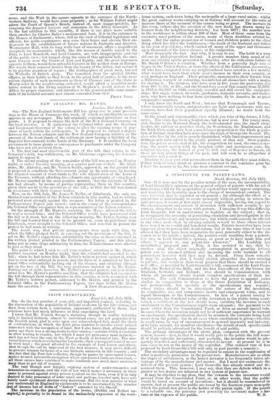NEW ZEALAND: MR. ILIWES.
London, 31st July 1851.
SIR—The New Zealand Settlements Bill has given rise to some proceed- ings in the House of Commons this week, of which DO intelligible account appears in any newspaper. The bill originally contained provisions on four points. 1. It proposed to charge the debt of the New Zealand Company on the local revenue. 2. It authorized the Colonial Office and the Governor and Lieutenant-Governor of the colony to alter the existing terms of pur- chase of lands within the settlements. 3. It proposed to submit a dispute between the Nelson colonists and the New Zealand Company relative to the amount of the trust-funds of the settlement (now become a liability of the Imperial Government) to the Lords of the Treasury. 4. It enabled the local government to issue grants or conveyances to purchasers under the Company who have not yet received them. 1. The first and most objectionable part of the bill, that relates to the Company's debt, was withdrawn, on Mr. Gladstone expressing his detenui- nation to oppose it.
2. The second reading of the remainder of the bill was moved on Monday night, or rather Tuesday morning, at a quarter past one o'clock. Mr. Glad- stone, Mr. Adderley, and Mr. 'Vernon Smith, opposed it, on the ground that it proposed to constitute the Government judge in its own ease, by leaving the disputed amount of trust-funds to the sole adjudication of the Lords o the Treasury, without affording the colonists any opportunity of Icing heard. Mr. Hawes asserted in the most positive manner, Nel- son had already, by means of parties representing them the colonists of Nel-
ng them in this country, / given their assent to the provisions of the bill ; so that the bill was framed in accordance with their express wishes.
Now, on the 19th July, Mr. James S. Tytler, of Edinburgh, the only au- ' thorized representative of the Nelson colonists in this matter, had in writing protested most strongly against the measure : his letter is printed in the Parliamentary Papers just issued ; and in the course of the correspondence the Colonial Office recognizes him as representative of the Nelson colonists. On the strength of Mr. Hawes's assertion, the House allowed the bill to be read a second time; and the Colonial Wise would have persevered with the bill as it stood, but on the following morning, Mr. Tytler, having seen the bill and learned that it was to be pressed on, came up post-haste from Edinburgh, went straight to the Colonial Office, and renewed in person the protest he had made in writing.
The result was, that private arrangements were made with him, by which the Office pledged itself, in carrying out the provisions of the bill, to act on Mr. Ts tier's suggestions, substantially the same as those contained in his written protest printed in the Parliamentary Papers; and this pledge being put in some shape satisfactory to him, the Nelson clauses were allowed to pass as they stood.
The point to which I wish to call your readers' attention is Mr. Hasves's positive assertion on Monday night, that the colonists had assented to the bill ; when he had before him Mr. Tytler's written protest against it, which was so soon after enforced in person, and the force of it admitted by the Co- lonial Office substantially backing out of the clauses, and adopting (though not on the face of the bill) the very provisions insisted on by Mr. Tytler. Putting out of sight, however, Mr. Tytler's personal protest, can you under- stand how Mr. Havies's positive assertion, that the colonists had assented to the bill through their representative in this country, is to be reconciled with Mr. Tytler's written protest, addressed to Mr. Hawes, and printed by the Colonial Office in the Parliamentary Papers,. two days before Mr. Hawes


























 Previous page
Previous page